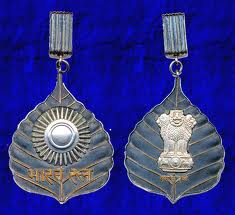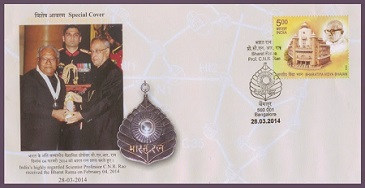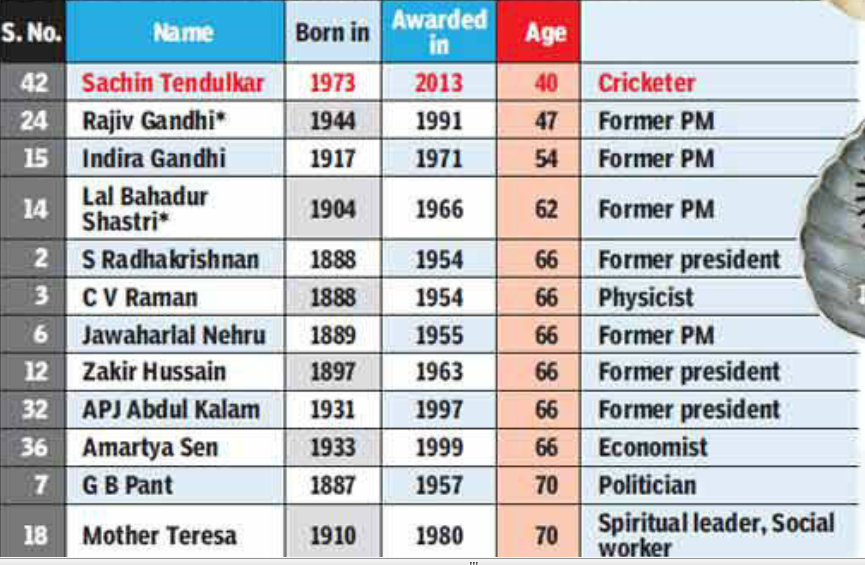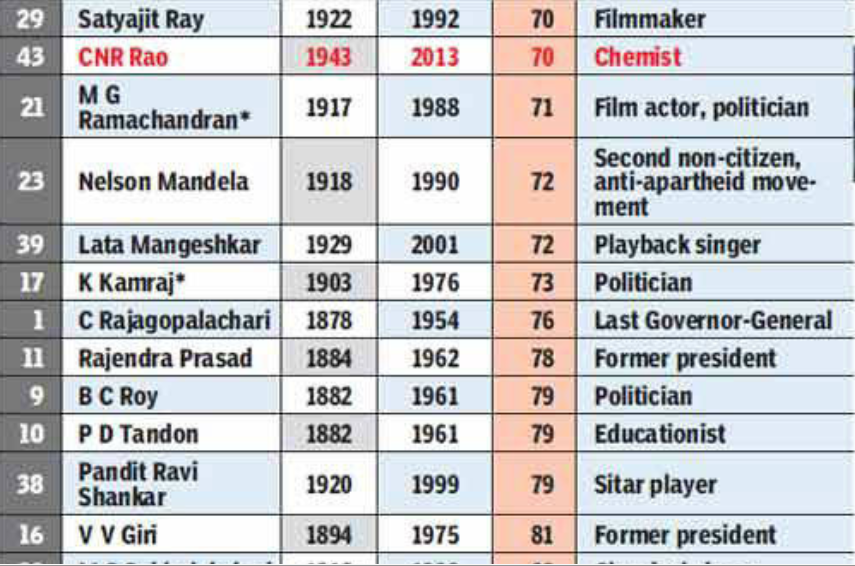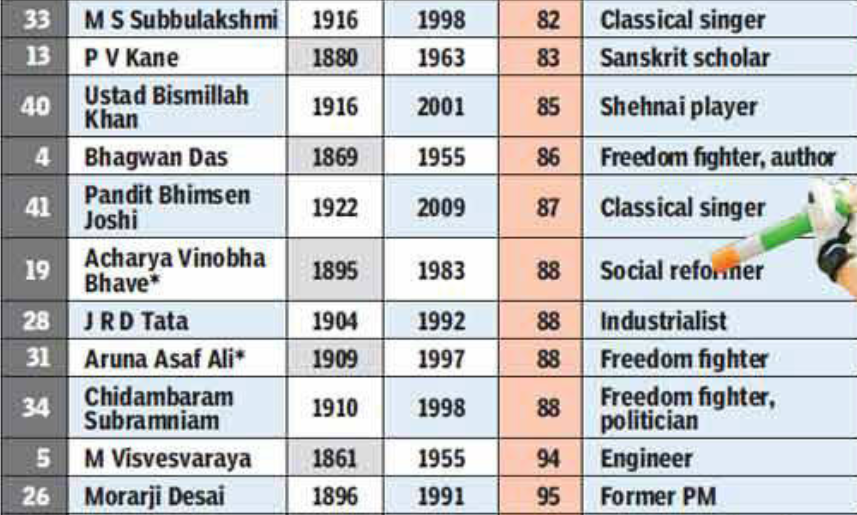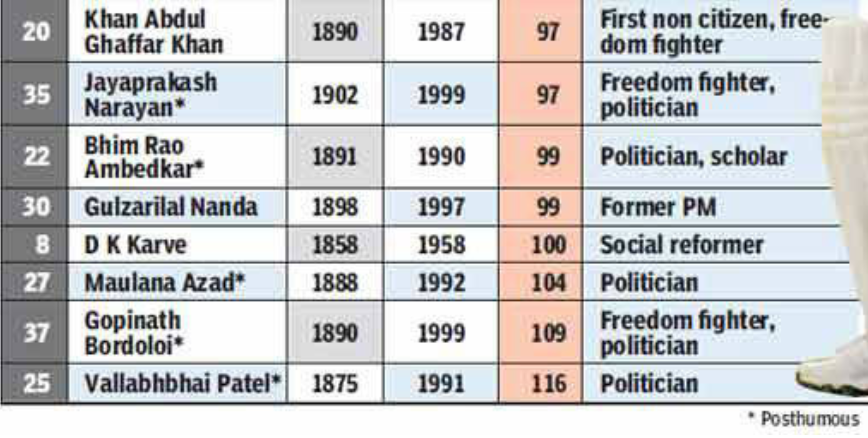Bharat Ratna
This article has been sourced from an authoritative, official readers who wish to add further details can do so on a ‘Part II’ of this article. |
Contents[hide] |
The sources of this article
INDIA 2012
A REFERENCE ANNUAL
Compiled by
RESEARCH, REFERENCE AND TRAINING DIVISION
PUBLICATIONS DIVISION
MINISTRY OF INFORMATION AND BROADCASTING
GOVERNMENT OF INDIA
+
Live Mint<>Best Guru<> One Shouldn't Give It To Dead People: Ramachandra Guha The Times of India Dec 25 2014...and other articles mentioned in the body of this article
Bharat Ratna
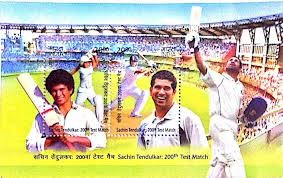
The Bharat Ratna (the Jewel of India) is India's highest civilian award. It was formally instituted on 2 January 1954, when a communique from the President’s office announced that a medal was to be awarded for “exceptional services towards the advancement of Art,Literature and Science, and in recognition of public service of the highest order.”
The award does not come with a monetary grant.
The medal The decoration is shaped like the auspicious Peepal leaf. It is about 5.8 cm long, 4.7 cm wide and 3.1 mm thick. It is made of toned bronze. On its obverse is embossed an icon representing the sun, 1.6 cm in diameter. Below this are embossed the words "Bharat Ratna" in Devanagari. The reverse bears the national Emblem and motto. The award is attached to a 2-inch wide ribbon and is designed to be worn around the neck. (Best Guru)
Questions have been raised about the constitutional validity of the award.
As per Article 18 (1) of the Constitution of India, the award cannot be used as a prefix or suffix to the recipient’s name. However, should an award winner consider it necessary, he/she may use the following expression in thei bio-data/letterhead/visiting card etc. to indicate that he/she is a recipient of the award: – ‘Awarded Bharat Ratna by the President’ or ‘Recipient of Bharat Ratna award’. (Best Guru)
In December 2011 the Government of India modified the criteria for Bharat Ratna Award. Since then sportspersons can also win Bharat Ratna Award.
Fresh conferment of the award was suspended from the 13th July, 1977 to 26th January, 1980.
Recommendations for the award of “Bharat Ratna” are made by the Prime Minister of India to the President of India and no more than three Bharat Ratna awards can be made in a year.
RECIPIENTS OF BHARAT RATNA
S. No. (historical order of conferment of award) Name, year of birth, year awarded in, field of eminence
1. Shri Chakravarti Rajagopalachari, (1878-1972) 1954, the only governor general of India
2. Dr Sarvepalli Radhakrishnan, (1888-1975) 1954, India’s first vice-president and second president, eminent philosopher and writer
3. Dr Chandrasekhar Venkat Raman (1888-1970) 1954, physicist, Nobel laureate
4. Dr Bhagwan Das, (1869-1958) 1955, eminent theosophist and freedom fighter
5. Sir Dr Mokshagundam Visvesvaraya, (1861-1962) 1955, the former Diwan of Mysore and a man often hailed as the “Father of Indian Civil Engineering”
6. Pt. Jawaharlal Nehru, (1889-1964) 1955, India’s first Prime Minister and, before he became PM, he was already an internationally renowned writer.
7. Pt. Govind Ballabh Pant, (1887-1961) 1957, freedom fighter and first chief minister of Uttar Pradesh, was conferred the award. Pant was also the Union home minister in 1955-1961.
8. Dr Dhondo Keshave Karve: (1858-1962) 1958, Social reformer Maharishi Karve, known for his work in the field of women’s welfare
9. Dr Bidhan Chandra Roy, (1882-1962) 1961, former West Bengal chief minister. Roy, who began his career as a physician, later became a freedom fighter and an important member of the West Bengal Congress.
10. Rajrishi Purushottam Das Tandon (1882-1962) 1961. is remembered for his efforts which went a long way in Hindi becoming India’s official language.
11. Dr Rajendra Prasad, (1884-1963) 1962, the first President of India
12. Dr Zakir Hussain, (1897-1969) 1963, then an eminent educationist who had helped set up Jamia Milia Islamia; also Vice President and later President of India
13. Dr Pandurang Vaman Kane, (1880-1972) 1963, Indologist
14. Shri Lal Bahadur Shastri (Posthumous), (1904-1966) 1966, former Prime Minister
15. Smt. Indira Gandhi, (1917-1984) 1971, then Prime Minister
16. Shri Varahagiri Venkata Giri, (1894-1980) 1975, former president of India
17. Shri Kumaraswami Kamraj (Posthumous), (1903-1975) 1976, former Tamil Nadu chief minister
18. Mother Mary Teresa Bojaxhiu Mother Teresa, (1910-1997) 1980, the first and only naturalised citizen of India to be given the Bharat Ratna. Mother Teresa, a social reformer, who founded the Missionaries of Charity, was born in modern-day Macedonia (Skopje).
19. Shri Acharya Vinobha Bhave (Posthumous), (1895-1982) 1983, social reformer, founder of the Bhoodan (land gift) movement Bhave also received the Ramon Magsasay award in 1958.
20. Khan Abdul Ghaffar Khan, (1890-1988) 1987, also known as the Frontier Gandhi, was born in undivided India became the first foreigner to be awarded the Bharat Ratna. A freedom fighter of Pakhtun ethnicity, Khan was the founder of the Khudai Khidmatgar (Servants of God) movement. Khan became a Pakistani citizen because of the subcontinent’s independence from British rule and partition in 1947.
21. Shri Marudur Gopalan Ramachandran [MGR], (1917-1987) 1988, (Posthumous) Tamil Nadu chief minister, legendary cinema megastar, popularly called Makkalthilagam (people's tilak) and Puratchi Thalaivaar (revolutionary leader). He founded the All India Anna Dravida Munnetra Kazhagam (AIADMK)
22. Dr Bhim Rao Ramji Ambedkar (Posthumous), (1891-1956) 1990, architect of India’s constitution.
23. Dr Nelson Rolihlahla Mandela, (b-1918) 1990, freedom fighter, anti-apartheid crusader, and the first black president of South Africa. Dr Mandela won the Nobel Peace Prize three years later in 1993.
24. Rajiv Gandhi (Posthumous), (1944-1991) 1991, former prime minister
25. Sardar Vallabhbhai Patel, (Posthumous) (1875-1950) 1991, India’s first deputy prime minister
26. Shri Morarji Ranchhodji Desai. (1896-1995) 1991, prime minister of India 1977-1979.
1992/ Netaji Subhash Chandra Bose: See elsewhere on this page.
27. Maulana Abul Kalam Azad, (Posthumous), (1888-1958) 1992, freedom fighter. During his lifetime Abul Kalam Azad declined The award arguing that it should not be given to those who have been on the selection committee.
28. Shri Jehangir Ratanji Dadabhai Tata, (1904-1993) 1992, industrialist
29. Shri Satyajit Ray, (Posthumous), (1922-1992) 1992, filmmaker
30. Shri Gulzari Lal Nanda, (Posthumous), (1898-1997) 1997, twice an interim prime minister of India,
31. Smt. Aruna Asaf Ali, (Posthumous) (1909-1996) 1997, freedom fighter
32. Dr. Avul Pakir Jainulabdeen Abdul Kalam, (b-1931) 1997, then a former aerospace engineer with Defence Research & Development Organisation (DRDO) and the Indian Space Research Organisation (Isro). He later served as India’s 11th president between 2002 and 2007.
33. Smt. Madurai Sanmukhavadivu Subbulakshmi, (1916-2005) 1998, pre-eminent singer, Carnatic classical music
34. Shri Chidambaram Subramaniam (1910-2000) 1998
35. Loknayak Jayaprakash Narayan (Posthumous) (1902-1979) 1999, social worker
36. Professor Amartya Sen, (b-1933) 1999; he won the Nobel Prize for Economics in 2001
37. Lokpriya Gopinath Bordoloi (Posthumous) 1999, freedom fighter and the first chief minister of Assam.
38. Pandit Ravi Shankar, (b-1920) 1999, sitar player who popularised Indian classical music not only abroad but also within India
39. Sushri Lata Dinanath Mangeshkar, (b-1929) 2001, singer of popular songs
40. Ustad Bismillah Khan (1916-2006) 2001, sarod player
41. Pandit Bhimsen Gururaj Joshi, (1922-2011) 2009, singer, Hindustani classical music
42 Sachin Tendulkar, (1973-) 2013, cricketer and Rajya Sabha MP. See also Sachin Ramesh Tendulkar 1: A timeline; Sachin Ramesh Tendulkar: 2 (records, factoids, tributes)
When it was decided to confer Sachin Tendulkar with Bharat Ratna, an RTI activist gave in writing to India’s Election Commission that such a declaration amounted to violation of the model code of conduct of the elections. In this petition, he opined that as Sachin had been nominated as an MP from Congress, if the Bharat Ratna were to be conferred on him, it would influence the ongoing voting process in states such as Mizoram, Chhattisgarh, Madhya Pradesh, Rajasthan and Delhi. This particular petition was not entertained by the election commission, based on the statement that if someone from non-polling states were to be given an award like Bharat Ratna, it is not included under the model code of conduct violation. (Bharat Ratna.co.in)
43 CNR Rao, (1943-) 2013, scientist, Chemistry
44 Atal Bihari Vajpayee, (1924- ), 2014, former Prime Minister
45 Madan Mohan Malaviya, (1861-1946) 2014, educationist founder of the Banaras Hindu University (BHU)
Netaji Subhash Chandra Bose
In 1992, a press release published by the President's Secretariat announced that Subhas Chandra Bose would be awarded the Bharat Ratna posthumously.
The Bharat Ratna Award was conferred on Subhash Chandra Bose posthumously while it is still a controversial matter as to whether Netaji is alive or not.
A PIL was filed to this effect in the Supreme Court, and the award committee could not produce substantial evidence of Netaji's death. Therefore, the Bharat Ratna Award given to Netaji Subhash Chandra Bose was withdrawn by the Supreme Court in 1992.
A report published in 1997 in The Indian Express said, "The declaration by a Division Bench comprising Justice Sujatha V Manohar and Justice G B Pattanaik came after the Union Government stated on affidavit that in deference to the sentiments expressed by the public and members of the family of Netaji, the Government of India did not proceed further to confer the award."
Sugato Bose, TMC MP and grand nephew of the Netaji, said that leaders such as Subhas Chandra Bose should be kept out of the ambit of such awards. He said that crusaders such as Bose and Mahatma Gandhi shouldn't be turned into pawns in a game of 'partisan politics'.
The Hindustan Times quoted him as saying, "Keep Netaji out of partisan politics… How can Netaji be given Bharat Ratna after Rajiv Gandhi? Anyone with a sense of history will agree with me." (First Post<> facebook<> The Times of India)
Distribution according to age
The Times of India [1] arranged all Bharat Ratna awardees till 2013 by the age at which they were awarded the nation's highest honour.
Distribution by state and city
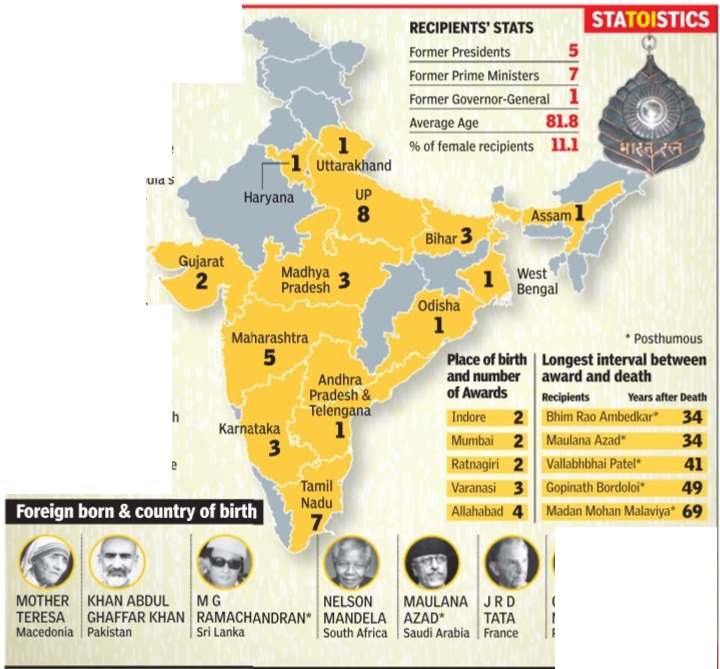
AND THE AWARD GOES TO.....
The Times of India Dec 25 2014
An analysis of other Bharat Ratna recipients shows that among the 37 born in India, more than 40% were born in either Uttar Pradesh or Tamil Nadu. Apart from Malaviya, three others were born in Allahabad, the highest for any city.
Distribution by vocation
1954-2008
Anil Dharker , The Times of India, 26/01/2008 Don’t devalue awards
This article does not include the 2008 list
From the time that the Bharat Ratna was instituted in 1954 till 2008, it had been given to 40 people, the first recipient being the scientist C V Raman. The awards have been given to five people representing the arts (Satyajit Ray, M S Subbulakshmi, Ravi Shankar, Bismillah Khan and Lata Mangeshkar), two representing literature and education (Bhagwan Das and Amartya Sen) and two men of science (Raman and Abdul Kalam).
In the list are five people listed for social service (D K Karve, Pandurang Kane, Mother Teresa, Vinoba Bhave and Khan Abdul Ghaffar Khan) and one for civil service (M Visvesaraya). Trade and industry is listed as a category, but you are unlikely to guess how many Bharat Ratnas have been given to our captains of industry. Just one — J R D Tata, as late as 1992. This adds up to a grand total of 16 awards given in 53 years to distinguished Indians in the arts, science and engineering, literature and education, social and civil service.
Perhaps it shouldn’t surprise us — but somehow it still does — that, in contrast, as many as 24 Bharat Ratnas have been awarded for what is euphemistically called public affairs, but really means politics. There are four presidents in the list (Rajendra Prasad, S Radhakrishnan, Zakir Hussain and V V Giri) plus C Rajagopalachari, who as governor general, preceded them. There are five prime ministers (Jawaharlal Nehru, Lal Bahadur Shastri, Indira Gandhi, Morarji Desai and Rajiv Gandhi). The remaining 14 include one foreigner (Nelson Mandela) and sundry politicians ranging from Vallabhbhai Patel, Maulana Azad and Jaiprakash Narain to Gulzari Lal Nanda, C Subramaniam and K Kamaraj.
In other words, it’s a case of politicians, once again, rewarding themselves. And doing so, without any feeling of impropriety, quite disproportionately. The timing of many of these awards have, more often than not, served narrow political purposes, such as honouring M G Ramachandran just before crucial Tamil Nadu elections, or V P Singh’s anointing of B R Amdbedkar around the time Singh was championing Dalits with the implementation of the Mandal commission’s recommendations on reservations.
Awarding people dead or long dead
Posthumous awards: Till 1966 the Bharat Ratna could not be awarded posthumously. The logic, rightly, was How far back into history will you go to confer this award? In 1966 an amendment was made to the rules to allow the award to be conferred posthumously.
Therefore, even Mahatma Gandhi was not awarded the Bharat Ratna because the award was instituted only six years after the Mahatma’s assassination.
In 2014, historian Ramachandra Guha found himself in the middle of a heated debate on social media.
Guha issued a series of tweets on the subject starting with, “One should not award it to people dead or long dead.“
He further tweeted, “The more I think of it, the more the award of the Bharat Ratna to [particular people long dead for their scholarship and patriotism, and their contribution to the freedom struggle, education and literature] strikes me as parochial and indefensible. In both spheres, there were far greater Indians. If [Bharat Ratna can be given to one particular luminary], why not give Tagore, Phule, Tilak, Gokhale, Vivekananda, [Bhagat Singh, Kamaladevi], Akbar, Shiva ji, Guru Nanak, Kabir, Ashoka, Bharat Ratnas too?“
“That said, I hope from now on there (is) no more posthumous Bharat Ratna, so that such rampant politicization is at least minimized,“ he wrote on his official twitter handle @Ram_Guha.
See also
Padma awards <> Bharat Ratna <> Padma awards: 2010<> Padma awards: 2011<> Padma awards: 2012<> Padma awards: 2014<> Padma awards: 2015<> Padma awards: 2016<> Padma awards: 2017<> Padma awards: 2018<>
